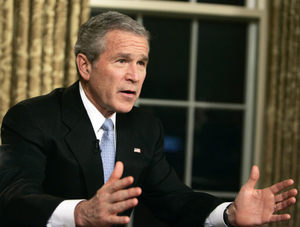 |
|
President Bush, giving a speech on T.V.
|
S.K. officials warn that North could lash out
"These days in the United States, you hear few calls for dialogue with North Korea. In the meantime, you can feel that the crackdown on illegal activities that began with Banco Delta Asia is expanding into wholesale financial sanctions." So says a Korean government official, talking about Washington’s approach to Pyongyang as of late. The U.S. Treasury’s undersecretary for terrorism and financial intelligence Stuart Levey is being watched closely by the media these days as the point man for the U.S. government’s financial measures targeting Pyongyang. In an interview with Reuters on August 21, he said the distinction between legal and illegal money held by North Korea is "almost invisible," and that the U.S. government "continues to encourage financial institutions to carefully assess the risk of holding any North Korea-related accounts." He does not even try to hide his intention to cut off North Korea from all of its funds because it is hard to tell what is legal money and what is not.Wherever Levey goes, he leaves closed North Korean accounts in his wake. One example would be Vietnam. Levey went there in mid-July, and soon afterward Vietnam closed all of its North Korean bank accounts. Reportedly, the money now unaccessible by Pyongyang includes money paid by South Korean broadcasting companies for the right to provide satellite coverage during separated family reunions. "It would be safe to say that, given the position the U.S. holds on the international financial scene, you’d be hard-pressed to find a bank that will say it is not doing anything illegal and has chosen to ignore U.S. warnings," said one diplomatic source familiar with the situation. Nigel Cowie, general manager of the Daedong Credit Bank, an international joint venture based in Pyongyang, said that Russia is the only financial channel left for North Korea. David Asher, former senior adviser of the East Asian and Pacific Affairs bureau at the U.S. State Department, was recently quoted by Radio Free Asia as saying that financial relations between the U.S. and Russia could be harmed if Russia continues to ignore illegal North Korean activities. Christopher HIll, the chief American negotiator at the six-party talks, is scheduled to visit South Korea, China, and Japan next month, and the widely held view is that his mission will be less about finding ways to jump start the six-party process and more about encouraging cooperation in the effort to apply more pressure on Pyongyang. The problem with that, according to a South Korean government official, is that it becomes "much more likely that North Korea will choose to act in an irrational and forceful manner if it has less room to maneuver because it is cornered like a rabbit by the U.S."






